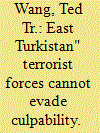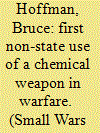| Srl | Item |
| 1 |
ID:
129267


|
|
|
|
|
| Publication |
2012.
|
| Summary/Abstract |
Terrorism is a major hazard in today's world and poses an enormous threat to the international community's peace, security, and order. Over the years, especially since the 1990s, "East Turkistan" forces in and outside China have, for the purpose of establishing an "East Turkistan State," planned and organized a series of bombings, assassinations, arsons, poisonings, assaults, and other terrorist incidents that have taken place in China's Xinjiang and relevant countries, causing serious harm to the lives and property of China's various ethnic peoples and to social stability and posing a threat to peace and stability of the relevant countries and regions
|
|
|
|
|
|
|
|
|
|
|
|
|
|
|
|
| 2 |
ID:
092304


|
|
|
|
|
| Publication |
2009.
|
| Summary/Abstract |
This article presents research conducted by the author in Sri Lanka to verify the first non-state use of a chemical weapon in warfare. This 1990 incident involved a primitive chemical attack perpetrated by the Liberation Tigers of Tamil Eelam (the LTTE or Tamil Tigers) on a Sri Lankan Armed Forces (SLAF) encampment in East Kiran, in the Batticaloa district of Sri Lanka. The article first describes the incident itself, before providing a brief description of the LTTE, its background, and the influence of its leader, Velupillai Prabhakaran. The article then analyzes the attack and places it within the context of theories about potential terrorist and insurgent use of unconventional weapons, such as chemical warfare agents. The research reported here is of interest not only because of the unique, opportunistic dimension of the attack, but also because its conclusions challenge the conventional wisdom about likely terrorist and insurgent use of these unconventional weapons and sheds new light on their interest and intentions in employing such weapons and tactics.
|
|
|
|
|
|
|
|
|
|
|
|
|
|
|
|